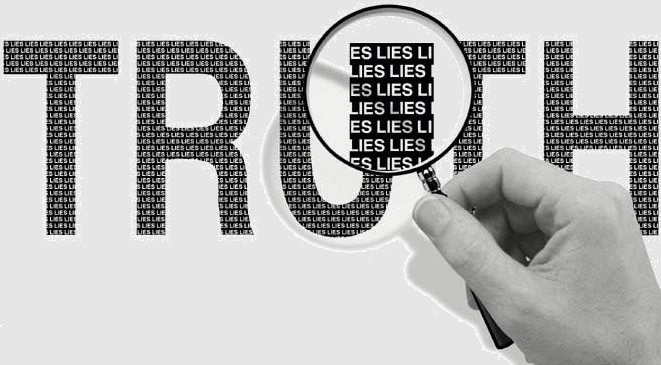Thoughts on parashat Vayeshev.
There is a big idea that is embedded in the Hebrew Bible that truthful speech (used by God) has a creative power and lies at the foundations of the world. Firstly, God uses truthful speech (God said, “Let there be…” or “Let us make…”) to transform tohu-va-vohu (chaos) into a habitable and ordered world. It is laid out starting at the beginning of the Book of Genesis (as well as developed in the Torah as well as in rabbinic and kabbalistic writings). This truthfully generated ordered world is at the same time good in its nature. Secondly, human beings are made in the image of God, in the image of that Truthful Divine Power.
People can tell when someone is speaking deceitfully. We, human beings, have a natural ability to distinguish someone who tells the truth and has positive intentions from someone who tells lies and wants to deceive us.
When you lie, you warp the structure of reality. The Bible contains many stories at the core of which is telling lies and it demonstrates, through these stories, how lies affect the chain of events that result one in another. It all basically starts with Jacob, Rebeccah and their deception of Isaac and Esau. The Torah does not explicitly condemn Jacob’s deception, and it cannot actually condemn it because the entire intrigue is a part of the Divine plan. However, as the story goes, Jacob faces consequences of his actions and receives his punishment: as a result of this plot Jacob he ends up completely destitute and at the mercy of a prominent liar, cheat, and deceiver – his uncle, Laban. Your behavior always leads you to a certain place – indeed, the story illustrates the concept that your moral standards have the power to determine your place in society. But this punishment is, again, a part of the Divine plan.
Jacob, however, did not internalize the mindset of a liar, let alone pathological one. He was outraged when he realized that he was deceived by Laban and, in fact, Leah as well:
All that night she (Leah) acted the part of Rachel. As soon as he rose in the morning “behold it was Leah,” he said to her: Daughter of the deceiver! Wherefore hast thou tricked me? Said she to him: And thou, why didst thou deceive thy father? When he said to thee: “Art thou my very son Esau?” Thou didst say to him I am Esau thy first born.” Yet thou sayest: “Wherefore then hast thou tricked me?!” And thy father did he not say of thee, thy brother came with trickery? (Midrash Tanchuma)
But it seems that Jacob’s moral attitude and partial regrets concerning Esau didn’t help a lot in this situation: the entire family was raised in Laban’s household and we know what damage being constantly exposed to lies and deceit can do to human beings and their moral attitudes.
Joseph, however, was the first of them who rejected lies and deception. Psychologically speaking, it might have to do with the fact that he was born shortly before his entire family left Laban’s household, thus his exposure to lies and deceit was decreased. It seems that Josef took his rejection to the extreme – he was painfully truthful. He spoke his mind the entire time and that’s the very thing that got him into trouble:
He dreamed another dream and told it to his brothers, saying, “Look, I have had another dream: And this time, the sun, the moon, and eleven stars were bowing down to me.” And when he told it to his father and brothers, his father berated him. “What,” he said to him, “is this dream you have dreamed? Are we to come, I and your mother and your brothers, and bow low to you to the ground?” (Gen 37:9-10)
What he says here sounds extremely arrogant to many people and the reaction of his family seems to be exactly like that. I, however, believe that given his young age – 17 – his only ‘sin’ was speaking his mind, without any restraints, which is not particularly uncommon among teenagers. However, I would suggest that in this story his truthfulness played at least the same as role as his arrogance, if not greater:
At seventeen years of age, Joseph tended the flocks with his brothers, as a helper to the sons of his father’s wives Bilhah and Zilpah. And Joseph brought bad reports of them to their father. (Gen 37:2)
Rashi explains what these ‘bad reports’ were about:
Whatever he saw wrong in his brothers, the sons of Leah, he reported to his father: that they used to eat flesh cut off from a living animal, that they treated the sons of the handmaids with contempt, calling them slaves, and that they were suspected of living in an immoral manner. (Rashi on Gen 37:2)
Not surprisingly Joseph was hated: that’s a typical fate of those who expose wrongdoings of others. Exposing lies typically makes liars angry – it’s a pretty obvious truth. The more powerful the liar is the greater is the danger for a truth teller. This has always been the case, unfortunately in every socio-political system that has come to existence, to a different extent but no system has been free from that. That’s why protecting the truth and those who tell the truth against various kinds of lies and deception (including those philosophically crafted deceptions like “the truth doesn’t exist” or “everyone has their own truth only and there is nothing beyond that”) is particularly important in our times, when telling is the truth has become more and more difficult and requires more and more courage. Joseph is ultimately elevated and becomes a savior of his family from famine and possible starvation therefore also its continuity. It all happens because he is telling the truth, so it is worth having this courage.
Shabbat shalom!

